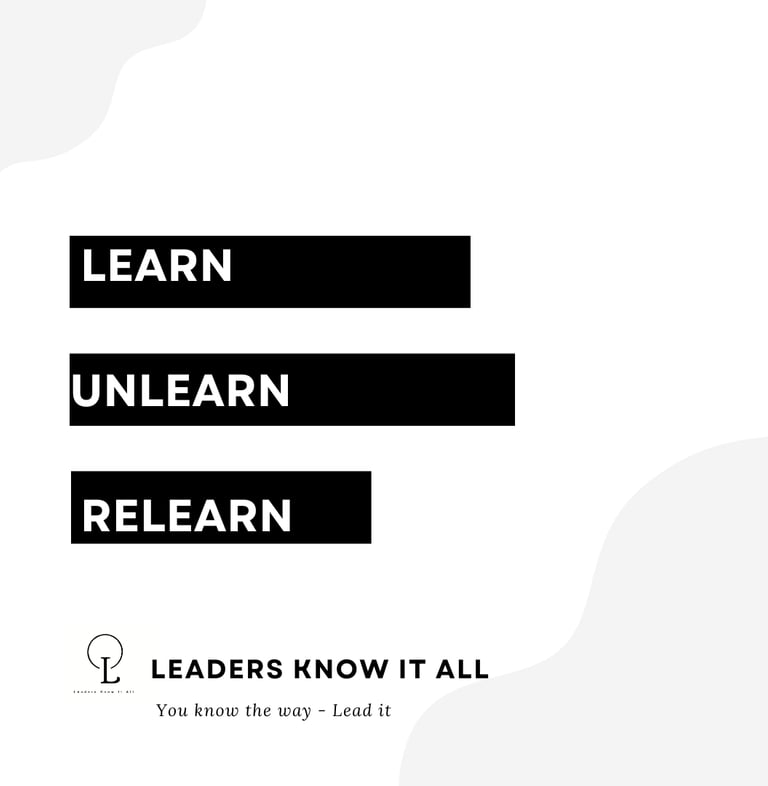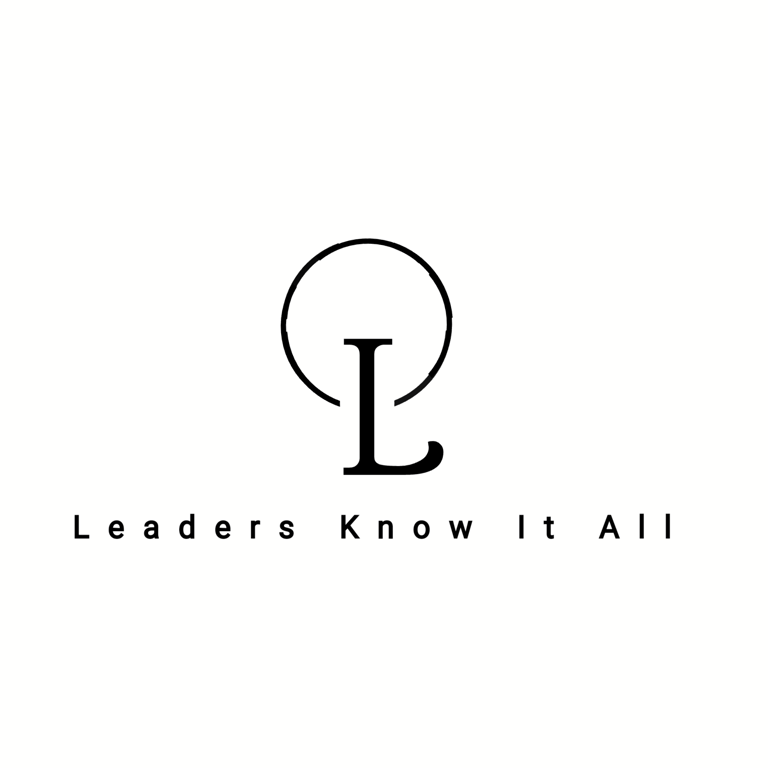Unlearn to relearn - Art of de-cluttering
For most of our lives, we keep cluttering our brains with everything, from wherever possible, needed or not.
LKIA
6/1/20235 min read


Learn, Unlearn, Relearn: The Lifelong Journey of Growth
Alvin Toffler once said something that has only grown more profound with time:
“The illiterate of the 21st century will not be those who cannot read and write, but those who cannot learn, unlearn, and relearn.”
Such a difficult truth, expressed in such simple words.
For most of our lives, we think of learning as accumulation—stuffing our brains with facts, lessons, experiences, and opinions. We add layer after layer of information, collecting ideas from schools, workplaces, mentors, social media, and even random conversations. Some of it is useful. Some of it is noise. But all of it sits there, shaping the way we see the world.
What we don’t realize is that learning alone isn’t enough. Sometimes, to truly grow, we must do something harder: unlearn what no longer serves us and make space to relearn what matters in the present moment.
Why Learning Alone Isn’t Enough
From childhood, we’re conditioned to treat learning as a one-way street. Schools reward memorization. Companies reward expertise. Society applauds knowledge. The more you know, the more valuable you are—or so we’re told.
But knowledge has a short shelf life.
Think about it:
Ten years ago, people thought Blackberry phones were the future. Today, they’re history.
Once, typing skills on a typewriter were a prized asset. Today, it’s coding or data analysis.
Even leadership styles have shifted—from command-and-control to collaboration and empathy.
What was once “right” can quickly become outdated. If we cling too tightly to old ways of doing things, we risk becoming irrelevant—not because we can’t learn, but because we refuse to unlearn.
The Challenge of Unlearning
Here’s the truth: unlearning is harder than learning.
When we first learn something, it feels fresh and exciting. But once an idea takes root, it becomes part of our identity. To unlearn it means admitting that what we believed yesterday may not work today. And that’s uncomfortable.
Think of an experienced professional who insists on sticking to old processes despite new technology. Or a leader who believes authority means never showing vulnerability. Or even an individual who resists feedback because it contradicts what they’ve always assumed about themselves.
In each case, unlearning requires humility. It requires saying: “I was wrong. I need to change.” And for many of us, that feels threatening. But it’s also liberating.
Relearning: The Bridge to Growth
Once you’ve unlearned something, you create space for relearning—the act of approaching knowledge with fresh eyes.
Relearning is not about starting from zero. It’s about layering new perspectives over old foundations. It’s the scientist who updates their understanding when new data emerges. It’s the manager who changes their leadership style as the workforce evolves. It’s the parent who adapts to modern ways of raising children instead of repeating outdated methods.
Relearning keeps us relevant, adaptable, and open to possibilities. It’s what turns experience into wisdom.
Wearing the Learner’s Mindset Everywhere
Toffler’s philosophy reminds us that learning isn’t something you do in school and leave behind. It’s a lifelong companion. But to truly embody it, you must adopt what’s often called a learner’s mindset.
This mindset says:
“I don’t know everything—and that’s okay.”
“What worked yesterday may not work tomorrow.”
“Every situation, even failure, has something to teach me.”
When you wear this mindset, you stop being rigid. You stop clinging to the past. And you start embracing change, not as a threat, but as an opportunity.
Learning, Unlearning, Relearning in Everyday Life
Let’s ground this idea in real-life situations:
1. At Work
An employee may have mastered Excel spreadsheets 10 years ago. But today, their organization runs on automated tools. If they insist on doing things “the old way,” they’ll fall behind. If they unlearn outdated habits and relearn the new tools, they’ll thrive.
2. In Leadership
Older models of leadership emphasized authority and control. Leaders barked orders, and employees followed. Today’s workforce values empathy, collaboration, and flexibility. Leaders who unlearn the command-and-control model and relearn human-centered leadership become far more effective.
3. In Relationships
We sometimes hold on to beliefs like “showing emotions is weakness” or “conflict ruins relationships.” But in truth, vulnerability builds connection, and healthy conflict strengthens trust. Unlearning these old narratives can help us relearn how to communicate better.
4. In Personal Growth
Maybe you grew up believing you weren’t “good with numbers,” or you “could never speak in public.” Those are limiting beliefs you need to unlearn. By relearning with practice and patience, you open doors you once thought were locked.
Why This Philosophy Is Crucial in the 21st Century
The world today is not just changing—it’s accelerating. Technologies evolve, industries transform, and knowledge becomes outdated at a pace we can barely keep up with.
Jobs that exist today may vanish tomorrow.
Skills that are in demand now may be obsolete in five years.
Social norms, political landscapes, and even cultural values are shifting faster than ever.
In such a world, clinging to past learning is like trying to navigate with an outdated map. To survive and thrive, we need agility. And that agility comes from learning, unlearning, and relearning.
The Emotional Side of Change
Let’s also acknowledge that this process is not purely intellectual. It’s emotional.
Unlearning can feel like loss—the loss of certainty, the loss of identity, the loss of “being right.” Relearning can feel vulnerable, like going back to being a beginner.
But if you can reframe it, you realize: this is growth. Every time you unlearn, you’re not discarding your past—you’re upgrading it. You’re proving to yourself that you are capable of renewal, no matter your age or stage in life.
Practical Ways to Practice Learn, Unlearn, Relearn
So, how do you apply this philosophy in daily life? Here are some practical steps:
Question assumptions. Ask yourself: “Is this belief still serving me?”
Seek diverse perspectives. Expose yourself to people, cultures, and ideas different from your own.
Embrace feedback. Instead of defending your old ways, see feedback as a gift.
Experiment often. Try new tools, methods, or routines. Even small experiments can spark relearning.
Stay curious. Read, listen, and observe. Curiosity fuels both learning and relearning.
Detach ego from knowledge. Don’t confuse being knowledgeable with being unchangeable. True wisdom is flexible.
A Story of Learning, Unlearning, Relearning
Consider the story of Satya Nadella, CEO of Microsoft. When he took over, Microsoft was seen as a giant losing relevance. The company had become rigid, tied to its old way of operating.
Nadella introduced a cultural shift built on one principle: moving from a “know-it-all” mindset to a “learn-it-all” mindset. This change required employees—and the organization itself—to unlearn the arrogance of expertise and relearn humility, curiosity, and collaboration.
The result? Microsoft reinvented itself and regained its position as a global leader.
That’s the power of this philosophy—not just for individuals, but for entire organizations.
Success in the Age of Change
Ultimately, success in the modern world is not about what you know—it’s about how quickly you can adapt. Knowledge is static, but learning, unlearning, and relearning keep you dynamic.
So, ask yourself:
What do I need to learn next?
What do I need to unlearn?
What am I willing to relearn, even if it feels uncomfortable?
Your answers may just determine how far you go.
Final Thought
“Learn, unlearn, relearn” is not just a catchy phrase. It’s a survival strategy. It’s a reminder that life is not about holding onto outdated maps but about continuously updating our compass.
Learning fills our minds.
Unlearning clears the clutter.
Relearning gives us direction.
In a world where change is the only constant, this philosophy keeps us relevant, resilient, and ready.
So wear the learner’s mindset wherever you are. Let go of the past when it no longer serves you. And step boldly into the future, knowing that you have the ability not just to adapt, but to thrive.
Because the true illiterate of the 21st century is not the one who cannot read or write—it’s the one who refuses to change.
Love and Light
Leaders Know It All
